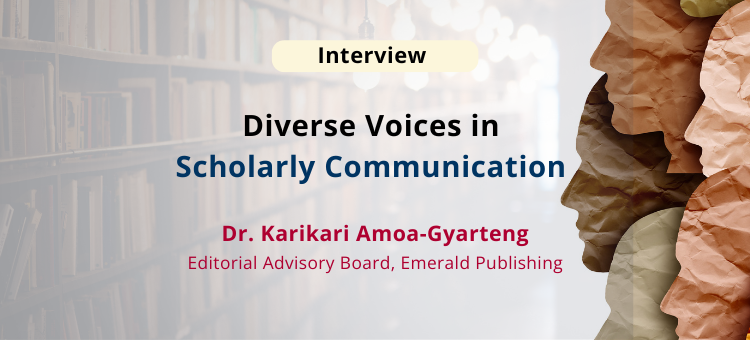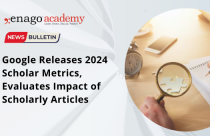Diverse Voices, Inclusive Publishing – Author perspectives on equitable research and entrepreneurship ecosystem

In our steadfast dedication to championing Diversity, Equity, and Inclusion (DEI), we engaged in an enlightening conversation with Dr. Karikari Amoa-Gyarteng, Editorial Advisory Board of the Journal of Small Business and Enterprise Development (Emerald Publishing). As a distinguished Research Fellow in the Business Management Department at the University of Johannesburg, Dr. Karikari brings a wealth of expertise in several entrepreneurship domains.
Dr. Karikari’s profound commitment to fostering inclusivity, along with his journey in academia and entrepreneurship, positions him as a unique and invaluable voice in our discussion. As we navigate the complexities of contemporary entrepreneurial landscapes, his voice emerges as a guiding source towards a future where research and entrepreneurial endeavors are equitable, accessible, and empowering for all.
Interview With Dr. Karikari Amoa-Gyarteng
Q1. Emerald publishing has been actively promoting global inclusivity and gender equality through their resources. As an Editorial Advisory Board Member for the Journal of Small Business and Enterprise Development, how do you ensure the representation of a diverse range of voices and perspectives in the content selection process?
“The goal of the Journal of Small Business and Enterprise Development is to distribute academic works that improve entrepreneurship theory, practice, and policy. It is dedicated to publishing creative and rigorous research on entrepreneurship and works to disseminate its important findings to academics, professionals, decision-makers, and the general public worldwide. The journal’s editorial team is committed to ensuring that the content published in the journal reflects a wide range of perspectives and voices. The editorial team follows best practices in academic publishing ensuring that reviewers are diverse and that the peer review process is rigorous and fair. The editorial board itself represents a diverse range of voices and perspectives from different backgrounds, disciplines, and regions to bring diverse viewpoints.”
Q2. How do you integrate principles of diversity, equity, and inclusion into the overall publishing strategy
“The Editorial Advisory Board itself reflects diversity in terms of gender, ethnicity, geography, and disciplinary backgrounds. Moreover, in adherence to the UN’s 2030 Agenda and its vision of a world without exclusion, Emerald Publishing disseminates research that provides a platform for all voices to be heard and understood.”
Q3. With so many publications on SMEs (small and medium-sized enterprises), what, according to you, acts as the limiting factor in boosting entrepreneurship in the middle-economy African countries?
“Boosting entrepreneurship in African economies faces various challenges. Key limiting factors include inadequate access to finance, infrastructure gaps, regulatory barriers, limited market access, skills and capacity gaps, political, and economic instability. In essence, a general lack of a conducive
ecosystem inter alia.”
Q4. Can you share a specific instance where your research findings or insights had a direct or indirect impact on a policy change, either at institutional or societal level?
“In my prior research endeavors, my focus predominantly centered on corporate finance and SME finance. Based on my findings, I have primarily advocated for small firms to rely on internal equity (such as retained earnings) as a primary means of achieving financial stability and mitigating the liability of newness. These insights have been seamlessly integrated into my entrepreneurial training programs, resulting in a notable shift in financing decision making among some of my trainees in the community. However, I have recently shifted my research focus to explore entrepreneurial ecosystems and emphasize the imperative for African governments to foster a conducive environment for economic development. Within these research papers, I have articulated policy recommendations with the aspiration that they will wield influence on policymaking, steering towards the creation of supportive
ecosystems that yield substantial economic benefits over time.”
Q5. Can you elaborate on the current financial distress in both corporate and entrepreneurial firms?
“Financial distress refers to situations where businesses encounter financial difficulties, including the inability to settle debts and obligations. Both corporate and entrepreneurial firms can experience financial distress, leading to negative consequences such as liquidation and bankruptcy costs. A report from the Boston Consulting Group in January 2021 showed that by the end of the second quarter of 2020, over 60% of US companies were facing financial or operational difficulties. This represents a 49% increase compared to the same period in 2019. Additionally, 14% of these companies were in distress, struggling to meet financial obligations or dealing with significant operational challenges that required major restructuring. That represents a 43% increase over the previous year. For entrepreneurial firms, a common challenge is the “liability of newness” which is the increased likelihood of failure that new businesses face simply because they are new to the market. A major factor contributing to the challenges faced by SMEs is the choice of funding. In some cases, entrepreneurs may opt for funding sources that are not well-suited to their business needs. For instance, reliance on short-term or high-interest financing without a clear repayment plan can strain the financial health of a new venture.”
Q6. Does this financial distress intersect with issues of diversity and inclusion? If yes, could you explain how?
“Indeed, there is proof that companies run by members of underrepresented groups — like women and minorities often have trouble obtaining traditional sources of funding. Furthermore, because they have lower cash reserves and weaker support systems, early-stage diverse-owned enterprises and small businesses may be the most vulnerable to economic downturns. These companies are probably going to have higher failure rates.”
Q7. We recently got an opportunity to publish your research summary on entrepreneurship in Ghana on our Open Platform. How do you engage with local communities in Ghana to ensure that entrepreneurship programs and initiatives are culturally sensitive and inclusive?
“By engaging with local entrepreneurs to understand their specific needs and challenges and offering capacity-building programs, sometimes in local languages, and trying to proffer local solutions to local challenges.”
Q8. With the growing emphasis on open access in research, can you share your perspective on the role of open access publishing in promoting diversity and inclusion in academia, and how can it contribute to amplifying underrepresented voices in the field of entrepreneurship?
“Open access publishing is vital for promoting diversity and inclusion in academia in all disciplines including entrepreneurship. It ensures global accessibility, amplifying voices from underrepresented regions. However, most researchers from developing economies face challenges accessing paywalled journals due to financial constraints. Additionally, the difficulty in publishing open access due to funding limitations limits their contribution. Platforms like DOAJ play a crucial role by offering global visibility, ensuring a more inclusive scholarly community.”
Q9. We recently conducted a global survey to explore the awareness and perspectives of the research community towards open access and its different funding models. Our survey found that over 57% of researchers refrain from publishing their research open access due to unaffordable APCs. How do you think we can balance the need for accessibility with the potential financial constraints that may arise for researchers and institutions?
“Researchers can choose affordable journals and advocate for transparent pricing models. Philanthropists can also fuel the open access movement by donating to support researchers and advocating for wider adoption. Policymakers can unlock the doors to open access by mandating funded research availability and raising public support and resources.”
Q10. Can you share your insights on researchers or academicians turning into entrepreneurs? What could be the future dynamics of researchers turning into entrepreneurs?
“Academicians transitioning into entrepreneurship can bring valuable skills and knowledge to the startup ecosystem. They have already learned how to be creative, think critically, and solve problems – all important for starting new and innovative companies. So, it’s a positive development. Startups led by academics can benefit from different skills and knowledge, which helps them be more adaptable and mitigate the liability of newness. Researchers turning into entrepreneurs may result in increased innovation, interdisciplinary ventures, strong focus on research and development, and adaptability inter alia.”
Q11. As an educator, how much do you think should students incorporate AI in their academic writing and research practices? How can they be equipped with the necessary knowledge and skills to navigate the intersection of AI and entrepreneurship?
“As an educator, I believe that incorporating AI in academic writing and research practices is becoming increasingly important for students. It could lead to improved efficiency and productivity and enhanced learning experiences. However, students could integrate AI into their academic writing but only under a strong emphasis on ethical considerations. Educational institutions should not only provide technical skills in AI but also instill a deep understanding of ethical principles, privacy concerns, and the responsible use of AI, ensuring a balanced and responsible approach. By integrating AI courses, hands-on projects, ethics training, entrepreneurship and innovation programs, and fostering critical thinking skills, students will be equipped with the necessary skills to navigate the intersection of AI and entrepreneurship”
On concluding this discussion with Dr. Karikari Amoa-Gyarteng, it becomes evident that the pursuit of DEI within research and entrepreneurship is not merely a task to be checked off, but rather a fundamental principle driving progress. His insights underscore the imperative of fostering inclusivity and accessibility in scholarly communication and entrepreneurial endeavors alike.
The journey towards a more equitable future in knowledge dissemination is ongoing, propelled by voices like Dr. Karikari’s, which illuminate the path forward with clarity and conviction. As the open access movement gains momentum, it is necessary that we heed the valuable suggestions offered by thought leaders like him to ensure its positive trajectory. It is through continued dialogue, collaboration, and a steadfast commitment to DEI principles that we will collectively shape a future where knowledge knows no boundaries. We invite all who share this vision to join us on our Open Platform, contributing their perspectives and experiences to further enrich the global scholarly community.








![What is Academic Integrity and How to Uphold it [FREE CHECKLIST]](https://www.enago.com/academy/wp-content/uploads/2024/05/FeatureImages-73.png)
